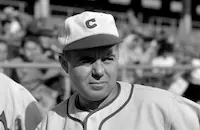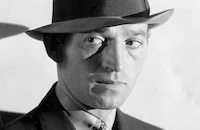Million Dollar Baby
Cast & Crew
Joseph Santley
Ray Walker
Arline Judge
Jimmie Fay
George E. Stone
Willard Robertson
Film Details
Technical Specs

Synopsis
Pat Sweeney, who has recently joined his parents, Gracie and Terry, in their travelling act, does a tap dance at a one-cent children's theater and later mischievously shoots his bean blower at the Marvelo brothers, destroying their acrobatic formation. The next day, the Sweeneys' boss, Mr. Freeman, fires them after receiving complaints that Pat should be in school. Bill, their agent, informs Terry that he cannot book the couple without the child, and Terry then decides to enter the reluctant Pat in a competition for a new child star in the style of Shirley Temple despite his declaration that he "ain't gonna be a dame." After several dreadful auditions, Pat is hired by J. D. Pemberton, whose financially strapped film company sponsored the contest, and dubbed the "Million Dollar Baby," due to the amount of insurance taken out on him. The Sweeneys are dispatched on a slow train to Hollywood, named the "Little Patricia Express," and they encounter publicity man Joe Lewis and Rita Ray, an old flame of Terry's, whose presence arouses Gracie's jealousy and leads to an estrangement between her and Terry. Meanwhile, Pat is up to his usual antics, and, at a stop in Kansas, he stars in a fashion show of dresses for little girls, and shocks the audience when he lets loose his pet mice. One evening, as Terry, Joe and Rita play cards and Gracie sleeps, the train makes a stop, and Pat uses the opportunity to run away. He soon meets a hobo named Jim, and they hide together in an abandoned farmhouse during a storm. Later, two cars drive up to the farm, one of which carries Mac, a wounded gangster boss. Mac's men send for a doctor and then discover Pat and Jim. When they learn that Pat is the "Million Dollar Baby," they decide to kidnap him. In the meantime, Terry, searching for Pat in an airplane, flies over the farmhouse and spots Pat writing his name on the roof with the doctor's bandages. Jim, Pat and the doctor manage to escape in one of the gangster's cars, and they are pursued into a barn, where they evade the crooks and then lock them inside shortly before the police arrive. After the Sweeneys' receive a $5,000 reward for their part in the mobsters' apprehension, Pat decides that they are now rich enough for him to admit on national radio that he is not a girl, and Joe declares that Pat's announcement will not prevent him from becoming a star, but will just be more good publicity.

Director

Joseph Santley
Cast

Ray Walker

Arline Judge
Jimmie Fay

George E. Stone
Willard Robertson

Ralf Harolde
Jeannette Loff
Arthur Stone
Harry Holman
Paul Porcasi
The Connor Twins

Edward Kane
Claudia Coleman
Marc Lawrence
Wilbur Mack
Lee Shumway
Ed Peil

Louise Beavers
Crew

Film Details
Technical Specs

Articles
Marc Lawrence (1910-2005)
Born Max Goldsmith on February 17, 1910, in the Bronx, Lawrence had his heart set on a career in drama right out of high school. He enrolled at City College of New York to study theatre, and in 1930, he worked under famed stage actress Eva Le Gallienne. Anxious for a career in movies, Lawrence moved to Hollywood in 1932 and found work immediately as a contract player with Warner Bros. (an ideal studio for the actor since they specialized in crime dramas). He was cast as a heavy in his first film, If I Had a Million (1932). Although his first few parts were uncredited, Lawrence's roles grew more prominent: a sinister henchman in the Paul Muni vehicle in Dr. Socrates (1935); a conniving convict aiding Pat O'Brien in San Quentin (1937); a menacing thug stalking Dorothy Lamour in Johnny Apollo (1940); the shrewdly observant chauffeur in Alan Ladd's breakthrough hit This Gun For Hire (1942); and one of his most memorable roles as Ziggy, a fedora wearing mobster in the Bogart-Bacall noir classic Key Largo (1948).
Lawrence, when given the opportunity, could play against type: as the prosecuting attorney challenging Tyrone Power in Brigham Young (1940); a noble aristocrat in the Greer Garson-Walter Pidgeon period opus Blossoms in the Dust; and most impressively, as a deaf mute simpleton in the rustic drama The Shepherd of the Hills (both 1941). Better still was Lawrence's skill at comedy, where his deadpan toughness worked terrifically as a straight man against the likes of Joe E. Brown in Beware Spooks (1939); Abbott and Costello in Hit the Ice (1943); Penny Singleton in Life with Blondie (1945); and Bob Hope in My Favorite Spy (1951).
After that, Lawrence's career took a turn downward spin when he was labeled a communist sympathizer during the Hollywood witch hunts of the early '50s. He was exiled in Europe for a spell (1951-59), and when he came back, the film industry turned a blind eye to him, but television overcompensated for that. Here he played effective villains (what else?) in a series of crime caper programs: Peter Gunn, Johnny Staccato, The Untouchables, Richard Diamond, Private Detective; and eventually made a welcome return to the big screen as a returning exiled gangster in William Asher's underrated mob thriller Johnny Cool (1963).
It wasn't long before Lawrence found himself back in the fray playing in some big box-office hits over the next two decades: Diamonds Are Forever (1971), The Man with the Golden Gun (1974), Marathon Man (1976), Foul Play (1978); and The Big Easy (1987). Sure he was cast as a gangster, but nobody could play a rough and tumble mob boss with more style or conviction.
Interestingly, one of his finest performances in recent years was in television, as a severely ill old man unwilling to accept his fate in a fourth season episode of ER (1997-98). His last screen role was just two years ago, as a nimble minded VP in Looney Tunes: Back in Action (2003).
In 1991, Lawrence published a memoir about his venerable career, Long Time No See: Confessions of a Hollywood Gangster that received much critical acclaim. He has also developed a cult following due to his appearances in such offbeat items as From Dusk to Dawn and Pigs aka Daddy's Deadly Darling, the 1972 horror film he directed and starred in with his daughter Toni. He is survived by his wife, Alicia; two children from a previous marriage, Toni and Michael; and a stepdaughter Marina.
by Michael T. Toole

Marc Lawrence (1910-2005)
Quotes
Trivia
Notes
According to publicity for the picture, four-year-old Jimmy Fay was discovered while accompanying his parents to his sister's screen interview. Daily Variety reported that after Fox's legal department registered a protest with the Hays Office and with Monogram Pictures over the "alleged kidding" of Shirley Temple in this film and its advertising, Monogram was requested to delete the several mentions of Temple's name in the film and in future advertising material.














